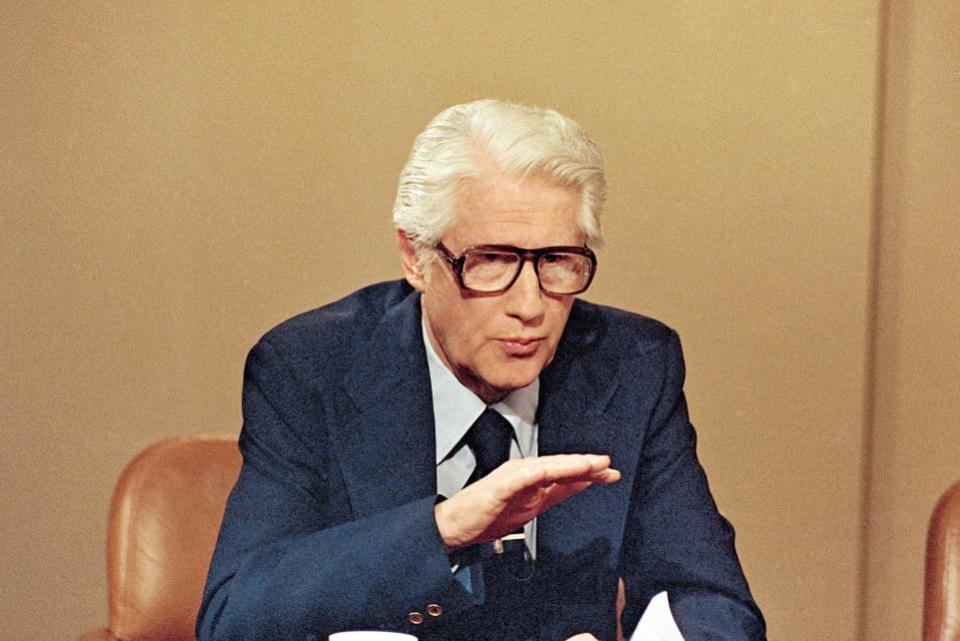Does the 'Mark Felt' Movie Get Deep Throat Right?
On a summer day in 2005, the political press turned its rapt attention to a 91-year-old grandfather living in Santa Rosa, California.
W. Mark Felt was an ex-FBI guy suffering from declining health and dementia. But in 2005, he would become famous not for anything he did this century but for who he had been over 30 years earlier. Felt, Vanity Fair exclusively revealed, was Deep Throat, the shadowy, unnamed FBI figure who secretly aided the press by leaking aspects of the Watergate cover-up. Deep Throat had been immortalized in All the President's Men as the cryptic source who meets Bob Woodward in a parking garage in the dead of night and urges him to "follow the money."
Related: The director of Mark Felt on FBI heroes and Watergate's relevance today
And all along it was Felt, the second in command at the FBI, who for years—and in his 1979 memoir—denied speculation that he was the source. Felt had planned on taking the truth to the grave, but his grown children discovered his secret and urged him to go public. They wanted him to own up to his legacy for posterity, yes, but also for some money. The book deals and film rights were bound to be lucrative, and the family needed cash. This, Vanity Fair reported, is what finally swayed Felt:
"Bob Woodward's gonna get all the glory for this, but we could make at least enough money to pay some bills, like the debt I've run up for the kids' education," [Felt's daughter] Joan recalls saying. "Let's do it for the family." With that, both children remember, he finally agreed. "He wasn't particularly interested," [Felt's son] Mark says, "but he said, 'That's a good reason.'"
The decision paid off. Felt quickly landed a book deal and sold the film rights to Universal Pictures. Filmmaker Peter Landesman completed a screenplay in 2008, the same year Felt died. And now, nine years later, we have Mark Felt: The Man Who Brought Down the White House, a fascinating and flawed thriller starring Liam Neeson in the title role. (It is fortuitous timing, considering that the Donald Trump presidency, and the Russia investigations in particular, has heightened public interest in Watergate.)
The likely audience for Mark Felt already knows the Watergate story, at least the broad strokes. What this film offers is a fresh vantage point as the drama unfolds, a viewpoint that's between the Nixon White House, with its dirty tricks, and the journalists frantically following the breadcrumb trail.

The movie delves deep into the FBI politics of the era. It opens with the 1972 death of longtime director J. Edgar Hoover and reveals how much Felt coveted his job, which instead went to Pat Gray (played by Marton Csokas). Gray, not Nixon, is the primary antagonist in this flick; we get an intimate glimpse of Felt's outrage as Gray pressures his underlings to wrap up the Watergate investigation, and his paranoia as Gray aggressively tries to sniff out the rat in his ranks. "The White House has no authority over the FBI," Felt declares angrily in one of many scenes that will remind you of the Trump-James Comey affair.
Felt was the rat, but why? And was he really the hero? Mark Felt does a decent job of showing how difficult it was for Felt to leak to reporters in that paranoid environment. (That's "reporters" plural—Time reporter Sandy Smith, surprisingly, gets more screen time than Woodward). But it doesn't fully grapple with why he took those risks—and the film has ignited a debate among historians and Watergate figures who argue that Felt was more focused on advancing his own career than ending Nixon's web of deceit.
"Felt was first of all looking out for himself, his own interest," says Max Holland, a veteran reporter who wrote the book Leak: Why Mark Felt Became Deep Throat. "His aim was to be director of the FBI, and he thought he could achieve that by leaking information about his rivals that could either put them in a bad light or have Nixon never nominate them and turn to Felt."
In early September, Holland published a Politico Magazine article about "The Myth of Deep Throat," intending to deflate the popular view that Felt's actions stemmed from a selfless sense of patriotism and duty, as well as disgust with Nixon's wrongdoing. Holland is not pleased with the Mark Felt he sees on screen.
"I think anything that portrays Felt other than a self-serving, devious FBI executive is a false portrayal," he tells me. "And I'm not making this up."
In his Politico piece, Holland theorizes that the reason Felt kept his identity a secret for decades is because he knew he "would be exposed as base and self-serving." (That is not quite what happened in 2005, of course.) The movie does show how deeply Felt cared about the FBI, and in one scene it suggests that the reason he was not fired when Gray turned against him was that he knew too many secrets. But it also treads a bit close to hagiography.
Woodward and his Washington Post colleague Carl Bernstein have also been outspoken about the liberties taken by the film. "Felt played a role, at times a courageous one," Woodward told the Associated Press this week. "But this portrait of him as ‘the man who brought down the White House’ just isn’t accurate."
The President's Men pair reportedly lobbied for the film's subtitle to be dropped, noting that many people deserve credit for exposing Nixon's cover-up. “Mark Felt was only one of several dozen sources we used."

John Dean, who served as Nixon's White House counsel during the early 1970s and who spent four months in prison for his role in the Watergate cover-up, has not yet seen the film. But he also takes issue with the subtitle.
"I find the title, The Man Who Brought Down the White House, about as accurate as claiming The Washington Post brought down the president," Dean tells Newsweek. "That just is not true. It's a myth that's out there."
Dean, not an impartial source on the subject of Watergate, says he doesn't feel anger toward Felt for leaking to the press. But he cautions against overstating Felt's role and claims that much of what Felt told Woodward wasn't accurate.
"I knew Felt personally," Dean says. "I had dealings with him. I think there is just no question he had ambitions to be the director [of the FBI]."
Today, Dean finds Holland's argument compelling. "I think his book just nails it—that Felt wanted the job, that he thought he could ease Gray out and show Nixon that he needed a Hoover protégé to keep that place under control. So that's why he started leaking."
Still, the intimate details of Felt's thinking and decision-making remain prickly and somewhat out of reach.
"I am somebody who doesn't believe we can ever know the motives of others," Dean says, "if that person doesn't want to reveal those motives himself."
With Taken star Neeson in the lead role, Mark Felt pumps up the paranoia and, with the aid of abrupt editing and intense music, tries hard to bring some action-movie urgency to the Watergate drama. It's compelling enough to be of interest to history buffs and those who only recently became interested in a Trumpian time.
For the real story, though, you'll have to head to an underground parking garage at 2 in the morning.
Related Articles
James Comey for President? The Director of 'Mark Felt' on FBI Heroes and Watergate's Relevance Today
Trump's America: What Watergate and Nixon's Downfall Can Teach Us 45 Years Later
Is Donald Trump Really Just Andy Kaufman in Disguise? An Investigation
With Trump as President, the Nixon Presidential Library Grasps at Redemption


